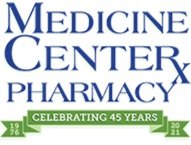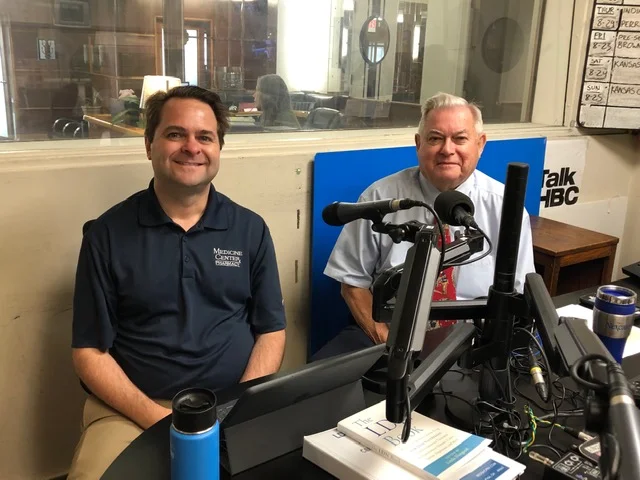Introduction
We've had a lot of questions about CBD in the pharmacy and as you drive around town and see signs everywhere from on telephone poles to gas stations and video stores. It's kind of make you wonder, “Okay, what's the deal with CBD?”. So, we're going to talk about CBD this morning and we're going to talk about what kind of product it really is, what you should be looking for and why it's important to find a source that's of high quality to get benefits for the body that you want. So, just as a reminder, you can subscribe to our podcast; you go to your smartphones app and you can look for our podcast Health Matters with the Medical Center Pharmacy. Please subscribe to us and we'd love to have you join us each week. [00:41
What is CBD oil?
CBD is Cannabidiol. It's a non-intoxicating cannabinoid found in cannabis. It has many potential therapeutic benefits including anti-anxiety, anti-inflammatory and anti-seizure suppression properties. It comes from a plant it called hemp, and it does not have psychoactive properties, which means CBD is not the same thing as medical marijuana. So, CBD has a profile cannabinoids in it that can help support the body's endocannabinoid system, but medical marijuana actually has high THC levels which is the psychoactive product which can get you high or hallucinogenic effects. So, they are two separate products even though they come from a very similar plant. [01:27]
Why does CBD belong in a pharmacy?
CBD currently is not recognized as a medical treatment or a drug. The FDA allows it to be sold in the US. It's basically sold as a dietary supplement but there are many therapeutic benefits which make it really belong in a pharmacy as far as I'm concerned, and the reason I feel it belongs in a pharmacy is because there are a number of different drug interactions that are possible. [03:48]
Uses of CBD
There are some studies and research that shows there's possibility that CBD could be supportive of anti-inflammatory processes and anti-anxiety effects. [04:25]
How does it work?
We have a series of receptors in our body that are part of what we call the endocannabinoid system, and when CBD stimulates these receptors, there is a potential for modulation of inflammation and pain, and also anti-anxiety properties based on how it affects your neurotransmitters; dopamine and glutamate releases. [04:45]
There's significant study that's been done on marijuana in proper for years back into the 60s and 70s, and one of the things that has been discovered are the CB1 and CB2 receptors, where both THC, and now CBD have influence on. And I'd like to give the analogy at the seminars that I've been giving in the last six months that a receptor in the body is kind of like a keyhole, and drugs or prescription drugs often affect receptors. And so in this case, CBD is a supplement or a natural product that has a key like shape that when you put it next to this lock, which is the receptor, it doesn't necessarily perfectly unlock the lock, but everybody probably has a key at home that's really worn down and you can kind of stick it in a lock it doesn't belong in and jiggle it and you sometimes can open that lock. [05:54]
Well, CBD and THC both have effects on receptors and as a result, they get a response in the body and that's where we believe that some of these anti-inflammatory and possibly anti-anxiety effects can happen. [06:52]
What is endocannabinoid system?
We have this whole system in our body, you're familiar with the respiratory system, or your digestive system, or your cardiovascular system. Well, we have what we call an endocannabinoid system, and it's this giant system of receptors in our body that can be stimulated by CBD, and also by medical marijuana or THC. [07:27]
What types of CBD are there?
There are a number of different forms. There are tinctures which are like an oil product where you'd administer it in a dropper under the tongue. There are capsules which you'd swallow orally, and there's topicals, creams, salves, lotions, ointments, and there's even inhaled smoke products which I can't get real excited about given some of the dangers we've learned about vaping lately, but there are inhaled products out there too. So, those are some of the forms and they can be used for different reasons. [09:47]
Other Keynotes
● Brad explained full spectrum, isolate, and broad spectrum CBD. [16:05]
● Discussion on dosages of different types of CBD. [17:54]
● CBD for pets and it helps with anxiety in pets. [26:17]
Upcoming Seminars for LDN and CBD Oil
We've had some really exciting seminars over the last six months, and the next one is coming up on February 6th, at 6:30pm. It's at the Hampton Inn meeting room in New Philadelphia, Ohio at 1299 West High Avenue. It's right off the interstate there at 77 and West High in New Philadelphia, and we've been talking about Low-Dose Naltrexone and CBD products. So, if you want a more in-depth see discussion, we're going to talk more on that Thursday evening in February about that. But Low-Dose Naltrexone is an interesting product because it also has uses that complement CBD in a fashion where they could even be used together. Low-Dose Naltrexone actually is an immune system modulator, and it helps with autoimmune conditions through a couple different mechanisms in the body and helps modulate the immune system, and it also helps reduce inflammation. To learn more about LDN benefits join us on February 6th or check out additional resources on our site.[34:30]
Flu and Shingles Vaccine
Well, I'm looking at the CDC’s season week one ending map on their website, and their week one ended on January 4th and this is the 17th. So, the data is a little bit behind, and almost the whole country is red for high flow activity except for little Ohio and Illinois. Ohio is on the minimal side, and Illinois is on the low side. So, it's there, it won't be long for us. There's a couple ways, if you haven't gotten a flu shot yet, get it today, I mean, today, because it's going to take a week or two to build up and you're running out of time. We have flu shots available, walk into any pharmacy and we'll fix you up. On the flip side, we do have the ability to give you flu or strep tests. [40:59]
So, don't be afraid to think of the Medicine Center if you need a strep test or a flu test, and, of course, if you don't test positive, that's great, but we can maybe recommend some over the counter medications for you to help you deal with those symptoms you're suffering with. [42:47]
Shingles is probably one of the biggest questions I get from patients that come in the pharmacy. There have been enough TV ads and enough stories from family members, loved ones or friends that people have shared some pretty frustrating experiences about having Shingles and people don't want it, and I don't blame them. Numerous vaccine came out a few years ago called Shingrix and it has extremely high effectiveness and activity for duration of use, and as a result, the demand has been so high, it's been very difficult for us to keep up pace. [43:18]
Medication Compliance with Easy Dose Packs
So, it's slick because one of our most popular requests in the pharmacy is, “How can you help me figure out how to keep my medication organized?” and when you start to take two and three and four medications a day, and you got to take one in the morning, and one at noon, and one at 4pm, and one at bed time. It gets to be a lot, we're all busy, we're all trying to keep track of things. So, the neat thing about these is it's nice little strip pack and they're customized by dose. So, if you're going to go off to work, you can take off Friday's pack and it might have your morning dose, and lunch dose, and afternoon dose. You don't have to take all your bottles with you to work, it's no sweat. So, it can be really flexible. We have patients that are in assisted living facilities or senior living that use these in own residence. We have truck drivers that drive across the country and they take their seven day strip pack and take it with them. They like it because it's easy, it's labeled and it's totally functional. So, it's something that we can even deliver to your home if you live in the community. So, if you're not able to get out, our home delivery service is available. [46:30]
● Summarization by Brad [48:35]
This episode is sponsored by Mercy Medical Center and Studio Arts and Glass.







